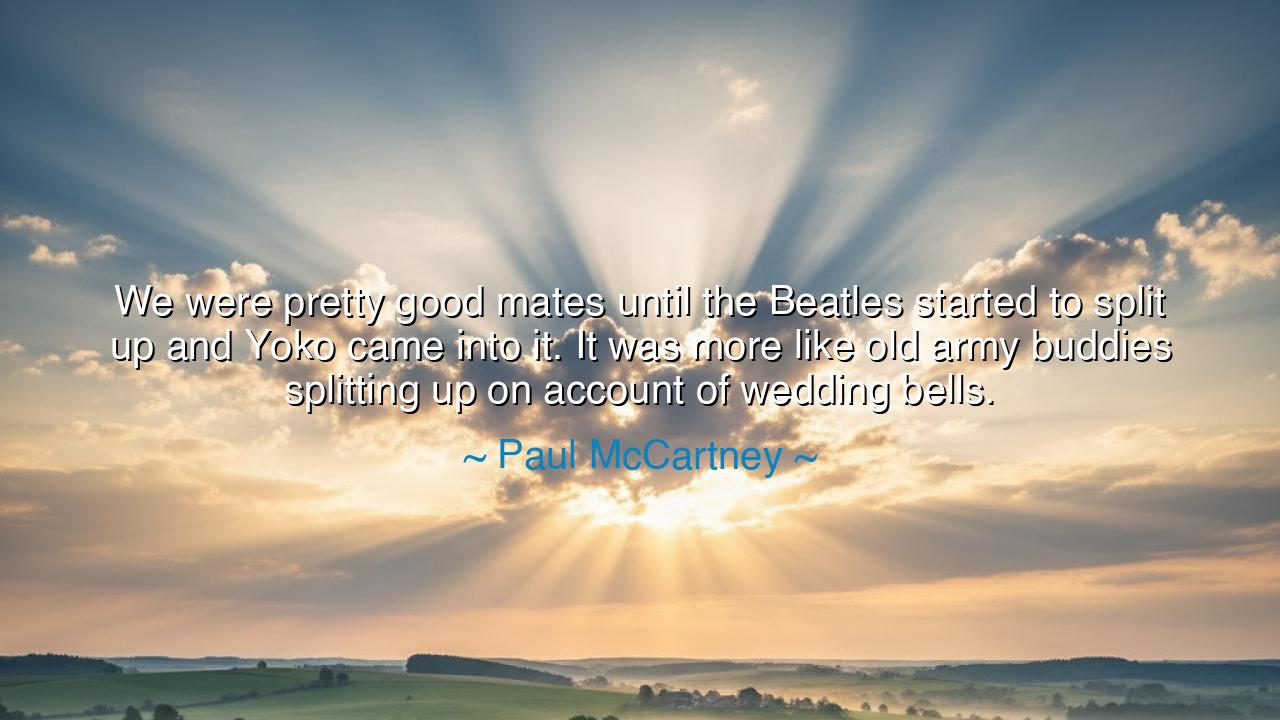
We were pretty good mates until the Beatles started to split up
We were pretty good mates until the Beatles started to split up and Yoko came into it. It was more like old army buddies splitting up on account of wedding bells.






In these reflective words, Paul McCartney speaks of the fragility of even the closest bonds when faced with the tides of change. He recalls that the members of the Beatles were once pretty good mates, akin to old army buddies whose loyalty and camaraderie had been tested and proven through shared trials. Yet, as the band began to split up, and Yoko Ono entered the lives of its members, relationships were strained and altered. McCartney likens this shift to the disruption of brotherhood caused by wedding bells, highlighting how love, commitment, and life’s transformations can redirect the course of long-standing friendships.
The origin of this sentiment is rooted in the understanding that human bonds, while strong, are vulnerable to external forces and personal choices. Throughout history, warriors, scholars, and artists have discovered that shared purpose unites friends temporarily, but individual paths inevitably diverge as life unfolds. McCartney’s words echo this timeless truth: even profound companionship can be reshaped or broken by changing priorities, new relationships, and the evolving landscapes of personal life.
Consider the story of Alexander the Great and Hephaestion, whose friendship was legendary. They shared the victories and perils of conquest, yet even their deep bond could not shield them from the influences of fate, politics, and personal desire. McCartney’s analogy to old army buddies captures the intensity of connection that precedes change, a bond forged in fire yet ultimately susceptible to the natural currents of life. Just as Alexander mourned the loss of his closest companion, so too did the Beatles face the reality that loyalty and friendship can be tested by the passage of time and the introduction of new influences.
McCartney’s mention of wedding bells underscores the transformative power of love and commitment. In many cultures, marriage has historically signified a shift not only in personal identity but in social alignment. Friends once inseparable may find themselves following new paths, drawn by the responsibilities and desires that marriage brings. This reflection illustrates that parting ways is often not a betrayal but a natural consequence of life’s progression, an inevitable reordering of relationships.
Ultimately, this quote is a meditation on change, friendship, and the passage of time. McCartney teaches future generations that bonds, no matter how strong, are subject to life’s currents. While nostalgia may linger for the unity of the past, growth and transformation are inevitable. Let this wisdom endure: the heart must accept that even the closest companions may drift apart, not through malice, but through the unfolding of life’s choices, love, and new beginnings.






AAdministratorAdministrator
Welcome, honored guests. Please leave a comment, we will respond soon